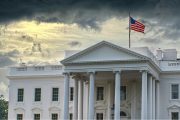
“We have bureaucrats usurping the sovereignty of the people and the state legislatures and we need to finally pull that back with Article V,” a Convention of States (COS) blog post explains.
In its identification of bureaucrats as enemies of republican government, COS is spot on. It its relentless push for a Constitutional Convention as the best weapon to fight that enemy, COS shoots far wide of the mark.
The author of the COS essay writes:
The federal Congress doesn’t want to see us exercise Article V because it would target federal bureaucrats and their authority. Term limits would be a career hindrance and restricted funding would be a spending hindrance. They have a vested interest in keeping Convention of States from making progress.
Before breaking down the claims made in the post, a question must be asked: Is there a Congress apart from the “federal Congress?” There are state legislatures, of course, but not one of them is called “Congress,” and there is a very good reason for that, and knowing the reason could actually assist COS and its supporters in understanding the Constitution better to the point where they would abandon their endeavor to expose the founding document of our union to the caprice and crony capitalism that would be hallmarks of an amendments convention.
Congress is defined in Samuel Johnson’s 1786 Dictionary of the English Language as “An appointed meeting for settlement of affairs between different nations.” For this reason, it is appropriate to call the lawmaking body of the union a “congress,” as each of the several states is “a sovereign body, independent of all others” (Federalist 39) and the representatives of those sovereign, independent republics come together to settle their common affairs.
For further evidence of this concept of a congress, consider the following statement of Edmund Burke made to the electors of Bristol in 1774:
Parliament is not a congress of ambassadors from different and hostile interests; which interests each must maintain, as an agent and advocate, against other agents and advocates; but parliament is a deliberative assembly of one nation, with one interest, that of the whole.
This concept of a “congress” is unknown to most Americans today, but if it were understood as our Founding Fathers understood it, it would go a long way toward restoring the proper constitutional relationship between the states and the federal government, including the intended distinct spheres of authority of those bodies and the role of states as sovereign republics forming a union for their benefit.
And that is why COS has no interest in educating the people about this irrefutable fact of constitutional history. COS has a vested interested in marketing a Constitutional Convention as the only means whereby the balance of power could be shifted back in favor of the states and the people. Knowledge of the precise definition of “congress” would lead the people to understand why the Founding Fathers called the federal legislative branch by that name, and why not a single state legislature is called by that name. This knowledge would ruin COS’s chances of convincing well-meaning Americans that nullification is unconstitutional and ineffective.
Now, as for the claim that Congress opposes an Article V Convention because of the effect such a convention would purportedly have on the power of the bureaucracy, that claim makes no sense at all to anyone familiar with the growth of the bureaucracy, its challenge to congressional authority, and the concept of “law.”
First, the federal bureaucracy isn’t usurping the sovereignty of the state legislatures; the bureaucracy was created by Congress and perennially funded by that body for the dual purpose of providing a foil for congressmen pretending to be pro-constitution; second, the bureaucracy relieves lawmakers of the accountability of enacting or defending laws that might draw opposition from constituents. With the existence of the bureaucracy, members of Congress can simply blame the bureaucracy for any unpopular or controversial regulation.
So, no, the federal bureaucracy hasn’t usurped state authority; it couldn’t. The federal bureaucracy is unconstitutional (at least, in its contemporary size, scope, and power) and is powerless to render the state governments impotent.
Unless, that is, the state governments chose to surrender their sovereignty to these often unnamed, always unelected and unaccountable bureaucrats. This they have done in many cases. But, rather than waiting the “10 to 25 years” Mark Meckler predicts it could take for a convention to be called, Americans could seek out and elect men committed to standing as sentinels of their states’ sovereignty and retained authority to refuse to cooperate with any unconstitutional act of the federal government.
The state legislator quoted in the COS article, Pennsylvania Senator Cris Dush, brings congressional term limits and a balanced budget amendment into the discussion. It’s a very awkward segue. If we are determined to restore sovereignty to the states and to remove from the federal bureaucracy the power it’s been given by Congress, term limits and balanced budgets are completely immaterial. Bureaucracies are beyond the boundaries of congressional term limits, and as long as legislators look for cover from criticism of constituents, then there will be money to fund the foils.
It is clear that all we need to do is to teach Americans about the now-forgotten definition of “congress” and how the implications of that definition would awaken Americans to the intended relationship between the states and the federal government.
There would be no need of running the risk of a Constitutional Convention that could see the protections of our rights amended out of existence. All that would be needed would be to redirect the substantial funds at the disposal of COS leadership away from calling a Convention and toward producing material that would educate Americans about these undeniable and unfamiliar principles of constitutional construction, about how one word in the Constitution — Congress — reveals the rightful role of state and federal authorities.
And that is why COS never stops selling an Article V Convention as the only way to force the federal beast back inside its constitutional cage. Those of us familiar with the history of the definition of “congress” and the self-serving congressional provenance of the bureaucracy appreciate that states already possess the power to put the federal government in its place, without any amendments or convention to propose them.





